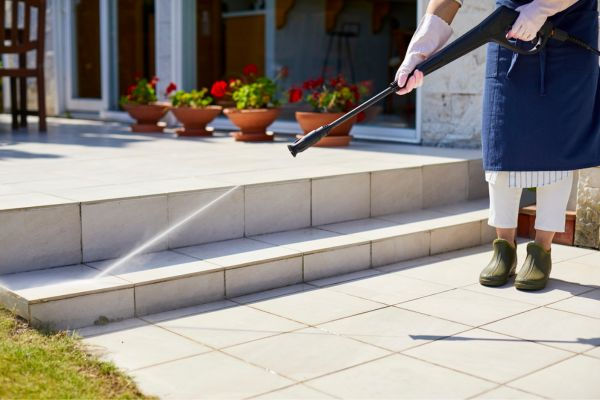DIY vs. Pro Pressure Washing in Manhattan Beach | Salty Panes
- Dave Marks
- 7 days ago
- 3 min read
Why Pressure Washing Matters on the Coast

Manhattan Beach’s salty air, ocean mist, and frequent marine layer create the perfect recipe for grime, algae, and corrosion on exterior surfaces. Routine pressure washing helps protect curb appeal and extend the life of siding, stucco, walkways, decks, and driveways—especially in coastal neighborhoods.
DIY Pressure Washing: Pros, Cons, and Real Risks
Pros
Lower upfront cost (if you already own or rent a unit)
Flexible timing—do it on your schedule
Cons & Risks
Surface damage: Too much PSI can etch concrete, scar wood decks, and strip paint.
Water intrusion: Forcing water behind stucco or under siding leads to mold and rot.
Injury hazards: Kickback, ladder use, and flying debris are real safety concerns.
Hidden costs: Renting equipment, buying detergents, and spending your weekend add up quickly.
Bottom line: DIY can work for small, low‑risk tasks (e.g., rinsing a patio), but it’s easy to overdo pressure and cause expensive damage in a coastal environment like Manhattan Beach.
Professional Pressure Washing: What You Get with a Pro

Right PSI, right nozzle for each surface—stucco, brick, composite deck, natural stone
Soft‑wash systems for delicate areas (oxidized siding, roofs, painted trim)
Eco‑conscious detergents and controlled runoff to protect the bay
Faster results with commercial equipment and trained techs
Less risk to windows, seals, and coatings in salt‑exposed zones
With Salty Panes, you also get a crew that understands South Bay microclimates, wind patterns, and how salty film builds up on ocean‑facing elevations.
Cost Comparison: DIY vs. Hiring a Pro in South Bay, CA
DIY: Equipment rental + detergents + water + 4–6 hours of your time. If mistakes cause etching or water intrusion, repair costs can far exceed a pro service.
Pro: Transparent pricing, the right process the first time, and a workmanship guarantee. Most single‑family exterior cleanups are completed in a single visit.
What Should Not Be Pressure Washed

Roof shingles (use soft‑wash only)
Old, failing paint
Cracked stucco or mortar (repair first)
Fragile wood or composite decks without testing
Window screens and aging seals
Best Timing for Manhattan Beach Homes
Spring: Clear winter grime and prepare for summer gatherings.
Late Summer/Fall: Remove salt spray and sunscreen/oil residues from decks and railings after heavy use.
After storms: Rinse off debris and contaminants quickly in ocean‑adjacent blocks.
Local Practices: Keep Runoff Out of the Bay
Protecting coastal waters is everyone’s responsibility. Always direct wash water to permeable areas and use approved cleaners. For guidance on preventing runoff pollution, see the EPA’s Nonpoint Source Pollution resources.
When DIY Makes Sense (and When It Doesn’t)
DIY fits: light rinsing of patio furniture, low‑pressure cleaning of a small patio, or removing loose dust from block walls.
Hire a pro when:
You see algae, oxidation, or stubborn stains
You’re cleaning multi‑story elevations or hard‑to‑reach areas
You have stucco, older paint, redwood/cedar, or natural stone
You need roof, fence, or deck restoration with specific chemistries
How Salty Panes Handles Pressure Washing in Manhattan Beach
Walkthrough & test spot: Identify sensitive areas and set proper PSI/flow.
Pre‑treat: Apply the right detergent to loosen grime safely.
Rinse/soft‑wash: Use controlled passes to avoid streaks and etching.
Detailing: Edges, window sills, and trim get a gentle finish.
Final check: Ensure runoff is managed and the site is pristine.
Explore our full Pressure Washing Services, plus window and solar panel cleaning tailored for South Bay homes.
FAQs
Will pressure washing damage my stucco? It can—if the pressure is too high or the tip is wrong. We use soft‑wash and fan nozzles to protect stucco texture and paint.
How often should I wash in a coastal area? Typically once or twice a year depending on exposure and landscaping.
Do you use eco‑friendly cleaners? Yes. We select biodegradable solutions and follow best practices to protect landscaping and waterways.
Call to Action
Ready to refresh your Manhattan Beach property? Contact Salty Panes in South Bay, CA for a free estimate—and enjoy a safer, brighter, longer‑lasting clean. Visit our Contact Page or call your local team today.
Comments